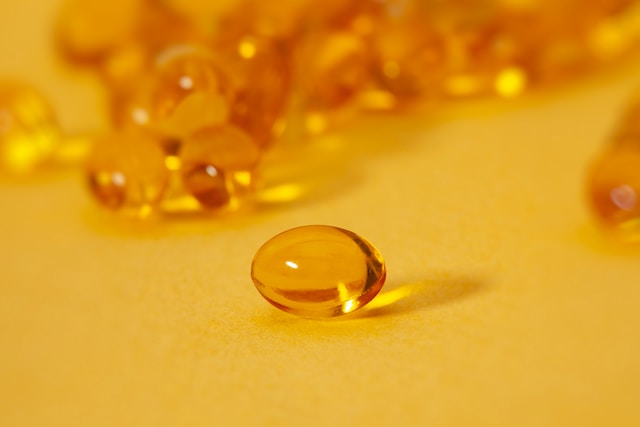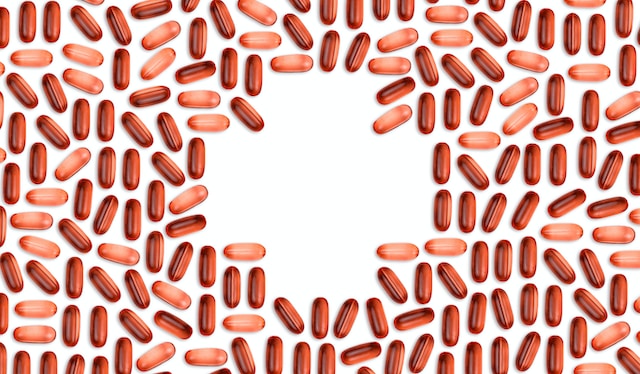Vitamin D is essential for our bodies to function correctly, yet many of us are deficient in it. That’s why getting your daily dose of vitamin D from various sources is essential.

A balanced diet, supplemented with natural sunlight, can help ensure you’re getting the right amount of this crucial nutrient.
In this article, we’ll discuss some great sources of Vitamin D to get your daily dose – so read on to learn more!
Health Benefits Of Vitamin D
Vitamin D is an essential nutrient for human health and can be obtained from various sources. It plays a vital role in bone health, immune system functioning, and other aspects of physical well-being.
When looking at vitamin D’s impact on bones, research has found that adequate levels of the vitamin can help build strong bones through better calcium absorption. Vitamin D also helps regulate phosphate levels, which further aids in building healthier bones. In addition to its effects on skeletal structure, studies suggest that higher amounts of vitamin D may reduce the risk of osteoporosis later in life.
The body’s immune system functions optimally when sufficient levels of vitamin D are present. Low levels of this key nutrient have been linked to increased susceptibility to infection and other illnesses like cancer or autoimmune diseases like multiple sclerosis. Studies have shown that increasing one’s Vitamin D intake could lead to more excellent protection against these types of conditions.
By understanding the various benefits associated with consuming enough vitamin D daily, individuals can make informed decisions about their diet and lifestyle choices. Eating many food items high in this nutrient is just one way to ensure our bodies receive what they need to stay healthy and vibrant!
Related Article: Why You Need Vitamin A For Healthy Vision
Sources Of Vitamin D
Sunlight is an excellent source of Vitamin D; it’s easy and free to get your daily dose outdoors.
You can also get Vitamin D from food sources like eggs, salmon, and mushrooms. Mushroom is one of the vegan sources of Vitamin D.
Supplements are another great option if you don’t get enough Vitamin D through sunlight and food. They’re an easy way to ensure you meet your daily needs.
It’s important to take Vitamin D supplements with food and talk to your doctor before starting any new supplement routine. Let’s dig into more details on the sources of Vitamin D.
1. Sunlight
The sun’s bright rays beckon us outdoors, providing an instant mood boost and a hint of warmth.
But did you know that sunlight is actually a natural source of vitamin D?
Our skin absorbs the ultraviolet radiation from sunlight and uses it to synthesize this essential nutrient.

Vitamin D absorbed through the sun is just as effective as its dietary counterparts in maintaining healthy levels of this vital nutrient in our bodies.
In addition to regular exposure to sunlight for optimal absorption, there are other ways we can get our daily dose of vitamin D naturally.
2. Foods high in Vitamin D
Aside from the sun, food is another excellent way to get our daily dose of vitamin D.
Certain foods are high in this essential nutrient and help us stay healthy by providing plenty of it!
Foods such as oily fish like salmon, mackerel, and tuna; dairy products like cheese, yogurt, and milk; mushrooms; eggs; and fortified breakfast cereals all contain decent amounts of Vitamin D.

Some other best sources of vitamin D are fatty fish, mushrooms, and fortified foods like dairy products, cereals, and orange juice.
Additionally, consuming these vitamin D-rich food items alongside calcium-rich foods helps to maximize their absorption into our bodies.
If you’re struggling to meet the recommended daily intake of Vitamin D, then there are always vitamin D serum or infusion treatments available from your local doctor.
So ensure you’re getting your fill of both vitamins when eating meals!
3. Supplements
One other way to get our daily dose of vitamin D is through supplements.
Supplements can be taken as pills, capsules, and even an injection if you need a higher dosage.
Vitamin D supplements are especially helpful for those who don’t get enough sunlight or cannot eat foods high in this important nutrient.

As with anything else, it’s best to consult your doctor before taking any vitamin D supplement, as they will know the right amount for your body type and lifestyle.
Additionally, those looking to increase their intake may benefit from combining both natural sources such as sunshine and food, with supplementation when needed.
All three options can help keep us healthy while allowing us to reach optimal levels of vitamin D!
Sunlight And Vitamin D
Sunlight is the primary source of vitamin D for most people. When exposed to direct sunlight, the body produces its own vitamin D, and it’s important to get some daily exposure without burning your skin.
Vitamin D deficiency can cause a wide range of health issues, including bone pain, fatigue, muscle weakness, and depression. Fortunately, there are many ways to ensure you’re getting enough vitamin D in your diet and through supplements or light therapy.

Vitamin D helps protect against cancer by boosting immunity and reducing inflammation. Studies have shown that higher levels of vitamin D may be associated with lower risks of several types of cancer.
To ensure adequate protection from potential cancers, it’s recommended that adults get at least 600 international units (IUs) per day of vitamin D from their diet or lifestyle activities like sun exposure or supplementation.
Since ancient times, light therapy has been used to treat various illnesses and conditions, such as seasonal affective disorder (SAD). It exposes patients to bright artificial lights to supplement natural light, which typically falls short during winter months.
Light therapy also increases Vitamin D production in individuals who cannot get sufficient amounts from natural sources due to living far away from equatorial regions or having darker skin tones with reduced absorption abilities.
Combining these two therapies – Vitamin D supplementation and light therapy – one can effectively combat symptoms caused by a lack of Vitamin D while simultaneously protecting themselves against certain cancers due to increased immunity and anti-inflammatory properties provided by the nutrient.
With more research being conducted on this topic every year, we can expect further advancements in understanding how best to use this powerful combination for maximum health benefits going forward.
Moving ahead, let us now look into the different signs and symptoms associated with a Vitamin D deficiency in our bodies to better understand what preventive measures must be taken if any are required…
Vitamin D Deficiency Symptoms
I’m sure we’ve all heard of the dangers of Vitamin D deficiency, but did you know it can cause fatigue, weakness, and bone pain?
It’s essential to get enough Vitamin D to avoid these symptoms.
Fatigue can be one of the earliest signs of a Vitamin D deficiency. This can make you feel tired and sluggish all the time.
Weakness can develop in your muscles if you don’t get enough Vitamin D. It can cause an overall lack of energy and make it hard to perform everyday activities.
Bone pain is also a common symptom of Vitamin D deficiency. This can cause aching and soreness in your bones and joints.
Let’s have a closer look at Vitamin D deficiency symptoms.
1. Fatigue
Are you feeling exhausted lately, no matter how much sleep you get? It could be a sign of vitamin D deficiency.
Fatigue is one of the most common symptoms of inadequate levels of this essential nutrient in your body. Vitamin D plays an important role in helping us feel energized and alert, so ensuring that we get enough through our diets or supplementation can help reduce feelings of exhaustion.
Taking vitamin d shots or increasing your intake through diet with foods such as fatty fish, fortified cereals, milk, etc., can help to boost energy levels.
Additionally, studies have found a link between low vitamin D and depression which also contributes to fatigue. To combat this issue, you should increase your daily dose beyond the suggested amount for optimal mental health benefits.
So if you’re looking for ways to give yourself an extra kick throughout the day without consuming coffee, make sure you are getting enough vitamin D!
2. Weakness
Weakness is another common symptom of vitamin D deficiency. Not only can it make our bodies feel fatigued, but it can also cause a decrease in muscle strength and damage our bones over time.
This is why getting the right amount of this essential nutrient is so important for maintaining good health.
The benefits of vitamin D go beyond just reducing fatigue though – research has shown that adequate levels are linked to improved heart health as well as reduced risk of multiple sclerosis.
Vitamin D helps reduce inflammation which can help protect us from developing certain chronic diseases or conditions such as the two mentioned above.
By supplementing with vitamin D, you’ll not only be able to fight off feelings of weakness but also potentially reap long-term health benefits that will keep your body strong and healthy for years to come!
3. Bone Pain
Bone pain is another symptom of vitamin D deficiency. This type of pain can range from mild discomfort to more severe, persistent aches and pains in various body parts – especially the bones and joints.
Low levels of this essential nutrient can cause our bodies to not absorb calcium properly, leading to weakened bones over time. It also increases one’s risk for developing osteoporosis or other bone-related conditions like rickets.
In addition, a lack of vitamin D can lead to muscle weakness which further exacerbates your experience with bone pain since it makes movements harder or even painful when affected areas are used.
So if you’re feeling unexplained aches and pains that don’t seem to go away no matter what you do, it could indicate an underlying issue with this important nutrient!
Thankfully, supplementing with vitamin D can help relieve these symptoms quickly and provide long-term protection against future issues related to our bones.
Plus, boosting your intake will come with additional benefits like improved immune system functioning and better heart health too!
Vitamin D And Bone Strength
Vitamin D deficiencies can severely impact overall health and wellness, but the effects of inadequate vitamin D intake on bone strength, in particular, are especially concerning.
Vitamin D is essential in calcium absorption, helping maintain healthy calcium levels in the blood and enabling bones to grow or repair themselves when necessary. Low vitamin D levels can lead to decreased mineral density, weakening bones that may be more prone to fractures and breaks.
In addition, research suggests that adequate amounts of vitamin D may help reduce inflammation in the body which could protect against some of the degenerative conditions associated with aging, such as osteoporosis.
Studies also show that having sufficient levels of vitamin D helps improve balance and coordination, which can further contribute to fall prevention among older adults.
With so many benefits for maintaining strong bones, it’s clear why it’s essential for people of all ages – from children through adulthood – to ensure they get enough good sources of this vital nutrient every day.
With a better understanding of how vitamin D affects bone health, we can now turn our attention toward its impact on another crucial system: the immune system.
Vitamin D And Immune System
Vitamin D plays an important role in the immune system, as it helps to regulate and modulate the body’s innate and adaptive immunity. It does this by activating specific cells in our bodies that fight off infections and diseases, such as T-cells.
Additionally, Vitamin D is essential for creating a strong barrier against infection, which can help reduce inflammation associated with autoimmune disorders.
Finally, Vitamin D deficiency has been linked to an increased risk of respiratory illnesses like pneumonia and bronchitis.
With its influence on the immune system, Vitamin D may also be beneficial in helping prevent certain types of cancer. Studies have found evidence linking higher levels of vitamin D intake to lower risks of colorectal and breast cancer development.
Additionally, research suggests that people who receive adequate amounts of Vitamin D are more likely to survive if diagnosed with some form of cancer than those whose diets lack this nutrient.
These findings show us how vital getting enough vitamin D is for both maintaining overall health and promoting disease prevention through bolstering the body’s natural defenses. Moving forward, we’ll discuss how diet and supplementation are key to ensuring you get your daily dose of vitamin D.
Vitamin D And Cancer Prevention
Our bodies need vitamin D for so many things—from keeping our bones strong to protecting us from cancer. But do we really understand how vital it is?

The truth is, research has shown that increasing your daily intake of vitamin D can help reduce the risk of certain types of cancer:
- Vitamin D helps regulate cell growth and repair DNA damage, which may prevent some cancers from forming.
- It also boosts immunity by activating white blood cells and helping them fight off invaders like bacteria or viruses.
- It increases the production of enzymes that break down carcinogenic compounds in the body before they can cause harm.
- Finally, it helps lower inflammation linked to several forms of cancer.
By understanding more about why vitamin D is important and learning ways to increase our intake, we can be better equipped to protect ourselves against these diseases.
Increasing Vitamin D Intake
We think one of the best ways to increase our vitamin D intake is to get more sunlight exposure; it’s easy and free!
We can also consider some diet changes, like adding more fortified foods or a supplement to our diets.
That said, it’s important to be mindful of the risks of too much sun exposure.
So maybe we could talk about how to balance getting enough sun with taking other measures to increase our vitamin D intake.
1. Sunlight Exposure
When getting your daily dose of Vitamin D, sunlight is one of the best sources. Exposure to natural light can help you receive the essential nutrient that your bodies need to stay healthy and strong. Sunlight helps stimulate absorption into our body’s cells, allowing us to reap all the benefits of its exposure.
It is important to remember that during peak sun hours, sunscreen should be applied if you plan on being exposed for more than 15 minutes. This will prevent any damage caused by intense UV rays while still allowing enough time for your skin to absorb some valuable Vitamin D.
Additionally, wearing sunglasses or a wide-brimmed hat provides further protection against damaging UV rays without blocking out too much beneficial sunlight. So make sure you get out there and enjoy some good old fashioned sunshine!
2. Diet Changes
Making changes to your diet is another great way to increase your daily Vitamin D intake. Eating foods that are rich in the nutrient can help you get all the benefits without having to worry about UV ray exposure.
Foods like salmon, tuna, egg yolks, and fortified milk contain high amounts of Vitamin D, so make sure to add them to your meals whenever possible. You can also take dietary supplements if needed for an extra boost.

Our bodies don’t as easily absorb vitamin D from food sources as sunlight, so it’s crucial to eat a balanced diet with plenty of essential vitamins and minerals.
Eating healthy fats like olive oil, avocados, nuts, and seeds will help support the absorption of nutrients while avoiding processed or sugary snacks, which can interfere with optimal digestion.
By making small changes to what and how we consume food, we can ensure that our body has enough Vitamin D to keep us feeling strong and energized!
Related Post: Top 7 Foods That Increase Hemoglobin Levels Naturally
Vitamin D And Other Conditions
It’s no secret that vitamin D plays an important role in our health, especially when it comes to keeping us healthy and strong. But did you know that getting your daily dose of this essential nutrient can also help manage certain medical conditions?
From diabetes and heart disease to cancer, many medical experts believe that taking a regular supplement of vitamin D may be beneficial for those dealing with these issues.
So how do you get enough of this sunny nutrient? Well, plenty of sources are out there – from sunshine exposure to dietary supplements like milk and fish oils. Incorporating more of these food sources into your diet is one way to increase your intake, but make sure not to exceed the recommended amounts, as too much can cause serious side effects.
Another option is to take a multivitamin which often contains additional vitamins and minerals such as Vitamin A, C, E, B6, and B12.
Whatever route you choose for increasing your intake of Vitamin D, it’s always best practice to consult with a doctor or registered dietitian before making any drastic changes. This will ensure you receive the proper dosage based on age, gender, lifestyle habits, and health goals.
With the proper guidance and advice from medical professionals, along with incorporating healthier eating habits into your routine – reaching optimal levels of Vitamin D is definitely achievable!
Conclusion
It’s important to get your daily dose of vitamin D for its many health benefits.
You can get it from various sources, including foods like egg yolks, salmon, and mushrooms, as well as exposure to sunlight.
If you think you may be deficient in vitamin D, look for symptoms such as fatigue, bone pain, and muscle weakness.
Consuming this essential nutrient has been linked with improved immune system function and reduced cancer risk.
Making sure you’re getting enough vitamin D isn’t hard – make sure to include some good sources in your diet and spend time outdoors when possible.
Increasing your intake could also help reduce the risks associated with other conditions, such as asthma and diabetes.
So don’t forget to prioritize your vitamin D needs!
Frequently Asked Questions
What food is highest in vitamin D?
Fatty fish, such as salmon, mackerel, and tuna, are some of the highest natural sources of vitamin D.
How can I get vitamin D naturally?
You can get vitamin D naturally from sunlight exposure and certain foods such as fatty fish, egg yolks, and mushrooms. Supplements can also be taken to boost vitamin D levels.
What is the fastest way to get vitamin D?
Sunlight exposure is the fastest way to boost your vitamin D levels, as your skin produces vitamin D when exposed to UVB radiation from the sun.
Which vegetables are high in vitamin D?
Mushrooms are the only natural vegetable source of vitamin D. However, some mushrooms have higher levels of vitamin D than others, such as shiitake and portobello mushrooms.
What are the signs of vitamin D deficiency?
Some common signs of vitamin D deficiency include fatigue, bone pain, muscle weakness, depression, hair loss, and impaired wound healing. Consult a healthcare professional for a proper diagnosis.
Is 2 eggs a day enough vitamin D?
Two large eggs can provide about 10% of the recommended daily intake of vitamin D. However, other sources should also be included in the diet to meet the daily requirement.
What fruit is highest in vitamin D?
Fruits are not typically high in vitamin D. However, some fortified fruit juices and cereals may contain added vitamin D.
What blocks vitamin D absorption?
Certain medications, such as corticosteroids and weight-loss drugs, can interfere with vitamin D absorption. High levels of calcium and phosphate can also decrease vitamin D absorption.
Which is the best fruit for vitamin D?
Fruits are not typically high in vitamin D. However, some fortified fruit juices and cereals may contain added vitamin D.
What makes vitamin D absorb better?
Vitamin D absorption can be increased by consuming it with foods that contain healthy fats, such as fatty fish, avocados, and nuts. Exercise and weight loss can also improve vitamin D absorption.
What happens when your vitamin D is low?
Vitamin D deficiency can lead to a number of health issues, such as weak bones, increased risk of fractures, and muscle weakness. It has also been linked to other conditions, such as depression, heart disease, and certain cancers.
Is broccoli high in vitamin D?
Broccoli is not a good source of vitamin D, as it contains very low levels of the vitamin.
Does avocado have vitamin D?
Avocado contains small amounts of vitamin D, but it is not a significant source of the vitamin.
References
1. Holick, M. F. (2007). Vitamin D deficiency. New England Journal of Medicine, 357(3), 266-281. https://www.nejm.org/doi/full/10.1056/NEJMra070553
2. National Institutes of Health. (2021). Vitamin D. https://ods.od.nih.gov/factsheets/VitaminD-HealthProfessional/
3. Harvard Health Publishing. (2020). Vitamin D and your health: Breaking old rules, raising new hopes. https://www.health.harvard.edu/staying-healthy/vitamin-d-and-your-health-breaking-old-rules-raising-new-hopes